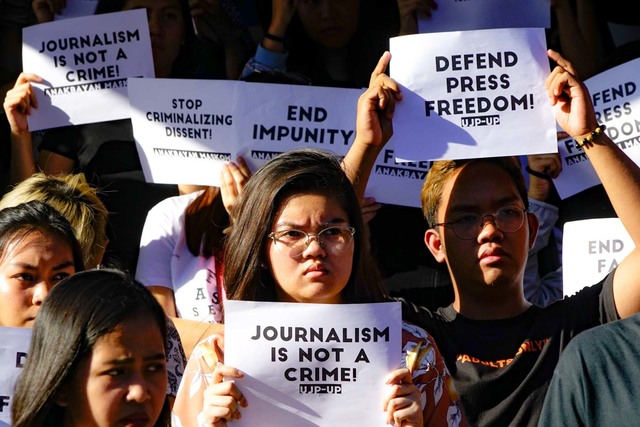
May 4, 2022, Sofia Guanzon
Philippine journalists have been facing intensified attacks on multiple fronts during this particular election season, says a press freedom study
MANILA, Philippines – Independent media in the Philippines has been combating various forms of attacks while also fighting disinformation online, that it needs a “societal response” to the scourge of lies.
Melinda Quintos de Jesus, executive director of the Center for Media Freedom and Responsibility (CMFR), made this recommendation in a forum on Tuesday, May 3 – World Press Freedom Day – as she gave an overview of the state of press freedom under the administration of President Rodrigo Duterte.
The forum – organized by the Freedom for Media, Freedom for All Network and the Wag Kukurap Coalition Eleksyon 2022 – highlighted the CMFR report on the experiences of Filipino journalists covering the 2022 elections.
Can media fight online disinformation while fending off those other attacks? De Jesus said: “It has to be a societal response. It cannot just be media because the power of the media draws out from the communities that it serves.”
Moving targets
The Philippines has consistently slipped further on the World Press Freedom Index, which assesses the state of media freedom globally. According to its 2022 report, the country ranked 147th out of 180 countries, lower than its 138th place in 2021.
Throughout Duterte’s administration, libel laws were weaponized and verbal attacks were hurled at independent media.
Most disturbingly, the country’s largest media network, ABS-CBN, had to shut down in 2020 after the House of Representatives, taking their cue from the President’s repeated threats to the network, voted to not renew the network’s franchise.
“Duterte’s hostility toward a critical press is a virus that has contaminated all organs of government,” De Jesus said
The CMFR report studied recorded incidents of harassment, threats, and killings of journalists from June 30, 2016, when Duterte assumed the presidency, to April 30, 2022. It was found that 23 journalists were killed during Duterte’s administration, across all mediums: 15 from radio, 6 from print, and 2 from online media organizations.
Most of these killings were concentrated in Ilocos Region, Bicol, Central Visayas, Socckscargen, Western Mindanao, CARAGA, and Davao Region.
“Journalists are moving targets of these forces because they exercise power of their own,” De Jesus said.
The CMFR also recorded 258 incidents of threats and attacks against journalists were recorde, including cases of libel, intimidation, online platform attacks, physical harassment, and arrest.
There was an increase in Distributed Denial-of-Service or DDoS attacks on news sites from November 30, 2021, to April 30, 2022. DDoS attacks are a form of cybercrime in which the attacker floods a server with artificial internet traffic to prevent legitimate users from accessing the sites.
In the same period, libel complaints were filed against 56 journalists. Journalists have been calling for the decriminalization of libel to prevent parties from using it to harass the media.
Election-related harassment
While election and campaign season is a historically violent time in the country, journalists in particular have been facing challenges on multiple fronts.
De Jesus shared incidents of harassment that occurred during the current election season which involved presidential frontrunner Ferdinand “Bongbong” Marcos Jr.
Marcos Jr. has been evasive with the press throughout his campaign, avoiding debates organized by major media organizations and the Commission on Elections (Comelec).
On April 13, Rappler reporter Lian Buan was was shoved by Marcos’s male security personnel and media relations officers to prevent her from interviewing Marcos Jr. at a campaign rally in Quezon City.
Other Rappler correspondents were also initially barred from covering a Marcos Jr. rally with his running mate Sara Duterte in Ilocos Sur last February 17.
Alongside incidents like these, journalists are being discredited while bloggers, influencers, and other social media personalities are free to spread unverified information.
“Suddenly we’re in a situation wherein we have to explain and justify our reason for being. We’re plunging further and further into the depths of ridiculousness. Kailangan pa ipaliwanag kung bakit kailangan natin ng reporters (We have to explain why we even need reporters),” Christian Esguerra of Facts First said.
Cong Corrales of the Mindanao Gold Star Daily shared a recent incident where their website collapsed due to over 60 million IP addresses trying to access it at the same time.
This is proven behavior indicative of a DDoS attack, which has become more frequent during the election season.
Marcos Jr.’s ‘deliberate, well-funded’ disinformation machinery
Following the changing role of social media as a primary source of information for news consumers, journalism has sought to adapt and simultaneously combat disinformation.
“Trolls are endangering press freedom kasi marami nagse-censor ng kanilang sarili (because they cause journalists to censor themselves), and that is detrimental first to the public’s right to know and for them to make educated and intelligent choices,” Corrales said.
He cited how publications are being targeted by troll farms, which have been considered a key factor in Duterte’s victory in the 2016 elections.
Regine Cabato, a Manila reporter for the The Washington Post’s Southeast Asian Bureau, most recently experienced these targeted attacks after investigating the Marcos family and covering Marcos Jr.’s campaign.
“It is no secret within our industry that those who write about the Marcos family are more vulnerable to harassment than if you write about any other candidate,” Cabato said. “There has been data, there has been research that shows that there is a very deliberate and well-funded machinery that basically serves a certain family’s interest for this particular election.” (READ: Tracking the Marcos disinformation and propaganda machinery)
In the Philippines, more than 120 organizations – from the media, the academe, and other advocacy groups – have formed the #FactsFirstPH coalition to fight disinformation. – Rappler.com